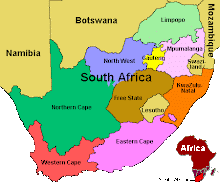Jess writes:
South Africa has several modes of transportation, the least of which (at least for PCVs) is the car.
First and foremost, is the “coombie” (spelled an assortment of different ways by different people). This public, mini-van taxi is used by almost all the locals, including PCVs, for all their daily transportation needs. The taxis, which resemble older models of Dodge Cargo vans, comfortably seat 13 people (3 per row and 1 up front)… So therefore, the minimum in each taxi is usually 16 (3-4 per row and 1-2 up front). And now a couple things about the coombies: 1) the seats are almost always broken, so getting from row to row is often tricky; 2) the speakers are almost always too big, meaning you will often hit your head as you move from row to row; 3) the windows are almost always kept close, so you wish you could just die from the heat; 4) the coombies are always full, which means you will likely be squeezed between at least a couple of overweight gogos or mothers, as well as their 6 shopping bags, 3 bags of produce, umbrella and purse, and at least one child.
Second, is the “Bakkie” – basically just the South African term for a truck with either an open or closed bed. These are not “permissible” forms of transportation for PCVs, but they are nevertheless one of the most common forms of transportation for workers, especially in the Nkomazi area. With such a large population of migrant workers, we see bakkies with no fewer than 6-10 people in the bed, crouching from the wind, rain, or sun. To date, the most impressive sighting was a bakkie with a large cage frame for shuttling cattle in which there must have been at least 20 workers crossing back over the border into Swaziland. And we thought coombies were squished…
Finally, are the donkeys. And no, these are not common modes of transportation in South Africa (they are, however, in Lesotho), but I mention them here because of a humorous discovery early on in our service. That is: a donkey actually costs less in South African than a bike. Yup, about r400 for a donkey, as compared to a minimum of r700 for a bike. Thus, when Peace Corps offered us bike stipends for getting to and from work, there was more than a few of us that considered the donkey option instead… none of us actually followed-through, of course, but it certainly would have made for a more entertaining commute!!
Subscribe to:
Post Comments (Atom)

No comments:
Post a Comment